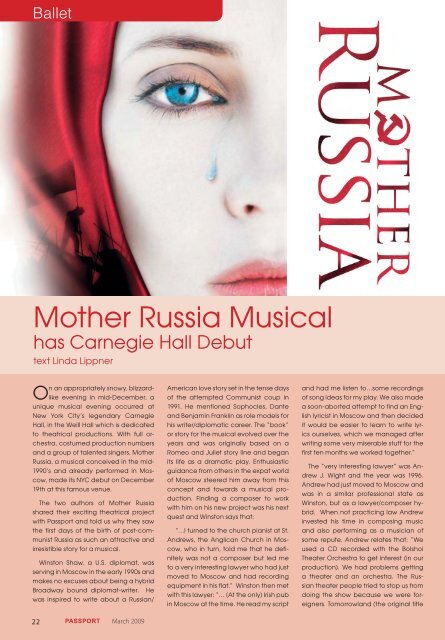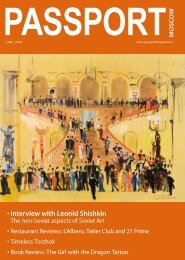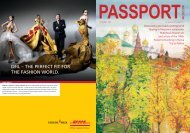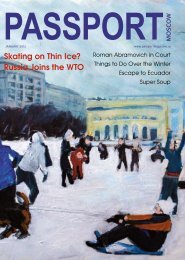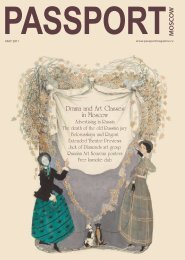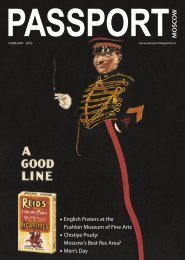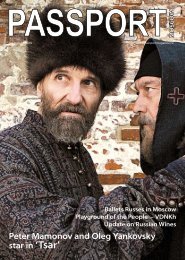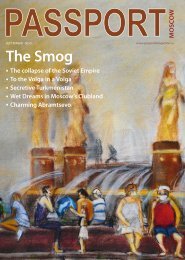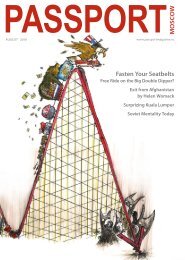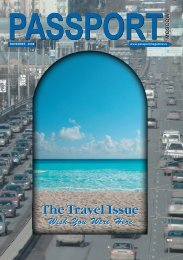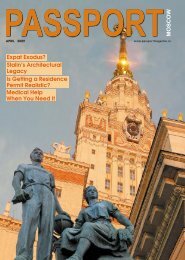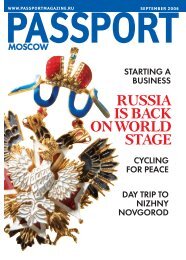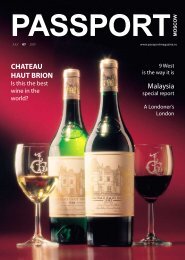A Truly Significant Holiday - Passport magazine
A Truly Significant Holiday - Passport magazine
A Truly Significant Holiday - Passport magazine
Create successful ePaper yourself
Turn your PDF publications into a flip-book with our unique Google optimized e-Paper software.
Ballet<br />
Mother Russia Musical<br />
has Carnegie Hall Debut<br />
text Linda Lippner<br />
On an appropriately snowy, blizzardlike<br />
evening in mid-December, a<br />
unique musical evening occurred at<br />
New York City’s legendary Carnegie<br />
Hall, in the Weill Hall which is dedicated<br />
to theatrical productions. With full orchestra,<br />
costumed production numbers<br />
and a group of talented singers, Mother<br />
Russia, a musical conceived in the mid-<br />
1990’s and already performed in Moscow,<br />
made its NYC debut on December<br />
19th at this famous venue.<br />
The two authors of Mother Russia<br />
shared their exciting theatrical project<br />
with <strong>Passport</strong> and told us why they saw<br />
the first days of the birth of post-communist<br />
Russia as such an attractive and<br />
irresistible story for a musical.<br />
Winston Shaw, a U.S. diplomat, was<br />
serving in Moscow in the early 1990s and<br />
makes no excuses about being a hybrid<br />
Broadway bound diplomat-writer. He<br />
was inspired to write about a Russian/<br />
22<br />
March 2009<br />
American love story set in the tense days<br />
of the attempted Communist coup in<br />
1991. He mentioned Sophocles, Dante<br />
and Benjamin Franklin as role models for<br />
his writer/diplomatic career. The “book”<br />
or story for the musical evolved over the<br />
years and was originally based on a<br />
Romeo and Juliet story line and began<br />
its life as a dramatic play. Enthusiastic<br />
guidance from others in the expat world<br />
of Moscow steered him away from this<br />
concept and towards a musical production.<br />
Finding a composer to work<br />
with him on his new project was his next<br />
quest and Winston says that:<br />
“…I turned to the church pianist at St.<br />
Andrews, the Anglican Church in Moscow,<br />
who in turn, told me that he definitely<br />
was not a composer but led me<br />
to a very interesting lawyer who had just<br />
moved to Moscow and had recording<br />
equipment in his flat.” Winston then met<br />
with this lawyer; “… [At the only] Irish pub<br />
in Moscow at the time. He read my script<br />
and had me listen to…some recordings<br />
of song ideas for my play. We also made<br />
a soon-aborted attempt to find an English<br />
lyricist in Moscow and then decided<br />
it would be easier to learn to write lyrics<br />
ourselves, which we managed after<br />
writing some very miserable stuff for the<br />
first ten months we worked together.”<br />
The “very interesting lawyer” was Andrew<br />
J. Wight and the year was 1996.<br />
Andrew had just moved to Moscow and<br />
was in a similar professional state as<br />
Winston, but as a lawyer/composer hybrid.<br />
When not practicing law Andrew<br />
invested his time in composing music<br />
and also performing as a musician of<br />
some repute. Andrew relates that: “We<br />
used a CD recorded with the Bolshoi<br />
Theater Orchestra to get interest (in our<br />
production). We had problems getting<br />
a theater and an orchestra. The Russian<br />
theater people tried to stop us from<br />
doing the show because we were foreigners.<br />
Tomorrowland (the original title


